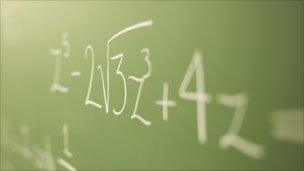Universities 'dumbing down on maths' to fill places
- Published
- comments

Maths is required for many subjects at degree level
Universities are having to dumb down the maths requirements on some of their courses in order to fill places, a report says.
It maintains that nearly two-thirds of the students accepted on courses needing post-GCSE maths do not have those skills.
The Advisory Committee on Mathematics Education report argues that this causes problems for students.
Ministers want students who fail GCSE maths to take it up to the age of 18.
The Acme report says 180,000 UK students entering university every year will encounter a significant amount of maths.
Filtering tool
A further 150,000 students in social sciences face some maths.
But only about 125,000 students continue studying maths beyond GCSE level.
The report said that for more selective universities, such as those in the Russell Group who tend to ask for higher A-level grades, mathematics requirements can be a useful filtering tool.
For less prestigious universities, "the inclusion of mathematical requirements can reduce the number of applicants to unsustainably low levels", it says.
The report quotes a tutor on a foundations-of-computing course, which includes mathematics that students need to complete their computing degrees.
The tutor says 70% of pupils do not have maths beyond GCSE and some of these are not the higher level of the qualification.
"The tutor of this course estimates that if a stronger mathematics background could be assumed for the cohort then this module could be shortened," it adds.
'Significant mathematical demands'
This would make room for an extra computing topic, the tutor said.
And the report refers to two chemistry tutors who said although their course did not require A-level mathematics it should do so.
It added: "There are clearly significant mathematical demands within chemistry degrees, and chemistry departments address this by aiming to ensure that their students study mathematics within their course.
"However, if their mathematics is weak, students will struggle."
Dame Julia Higgins, who chairs the Advisory Committee on Mathematics Education, said all students should study maths until the age of 18.
She said: "In the last 30 years, many university subjects have become more mathematical but the number of students with the appropriate level of mathematical skills has not risen far enough to match this.
"In order to do this, additional courses need to be developed for study at the post-16 level."
The report also warned that some schools were discouraged by the system of league tables in England from entering many students for high-level maths courses, either at GCSE or A-level.
It also suggested that some students were being drilled to pass exams rather than understand mathematical concepts.
A Department for Education spokesman said: "All young people must be able to demonstrate their understanding of maths, whether they are going onto further study or into employment.
"A good qualification in maths is demanded by employers.
"That is why we have announced plans for all young people who fail to get a C or better in GCSE maths to study the subject up to 18, until they get a good qualification."
- Published12 May 2011
- Published9 May 2011